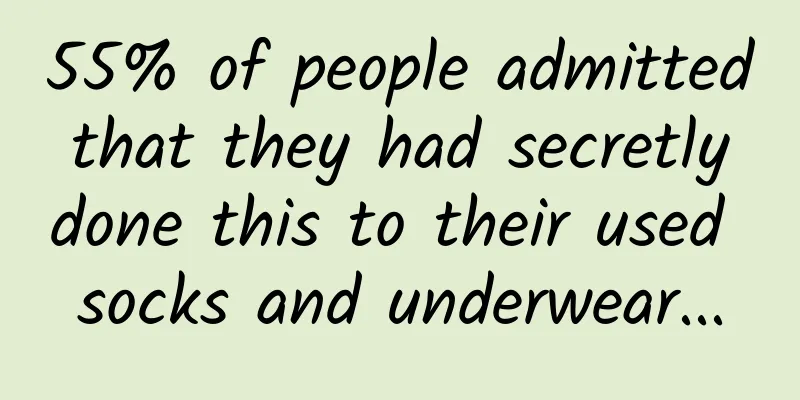55% of people admitted that they had secretly done this to their used socks and underwear...

|
Do you smell your hands, armpits, used socks or underwear when no one is around? Don't be shy, more than 94% of people admit it. Not only do people smell themselves, they do it frequently and in public, in front of other people. If you don't believe me, count how many people around you put their hands on their faces, sometimes not just as a habit, but also to get their hands close to their noses. Admit it! You sniff yourself too. Most people smell themselves in secret, but they don't want to admit it to others, so for a long time, no one knew what percentage of people actually smell themselves, and whether they do it occasionally or regularly. Recently, a study collected 404 online questionnaires for this purpose. The results showed that 94.31% of the participants admitted to smelling their hands, of which 30% often smelled, 42% sometimes smelled, and 24% occasionally smelled. The number of participants who admitted to smelling their armpits was also as high as 91.58%. As for putting their hands in their armpits or crotch and then smelling them, 55.94% of the participants admitted to smelling the odor of their armpits, and 73.89% of men and 55.69% of women reported smelling their crotch. In addition to smelling themselves directly, many participants also smelled the odor from the clothes they had worn. The proportions from high to low were tops 95%~96%, socks or shoes 76%, and underwear 55%~65%. Although this is only a preliminary study, with a small number of participants, and the answers are all self-written, which may not be completely consistent with real behavior, we can at least see that self-smelling is very common. If you have also smelled yourself, but have never seen others do it, don't worry that you are abnormal, in fact, most people who smell themselves are the majority! Can't see people smelling themselves? Count how many people are "touching their faces" There are still many people who often smell themselves in public places. The reason why you rarely see them is that everyone thinks it is "unseemly" and the action of smelling is more covert. Many mammals frequently smell with conspicuous movements, but we don't want to believe that our behavior is so similar to that of cats, dogs or donkeys, and we often associate body odor with uncleanliness and illness, so we think that the act of smelling is not good. People may use other actions to cover up the desire to smell themselves without being seen. Watch your colleagues at your next meeting. Within a few minutes you will see someone with their hands around their nose. They appear to be holding their chin or touching their face. Next, count the number of times each person puts their hands on their face. The frequency is probably several times higher than you think. A study analyzed videos of 26 medical students listening to lectures. The students knew they were being filmed for behavioral analysis, but did not know the specific content of the analysis. During the four-hour lecture, the medical students touched their faces an average of 23 times per hour, of which about 7 times per hour specifically touched their nostrils. Some people would explain that touching their face is just a habitual action, like stroking their hair or crossing their legs, and it is not for smelling their hands. Therefore, the researchers verified the relationship between touching the face and smelling the hands through nasal air flow. The test data showed that when the participants touched their faces with their hands, the average nasal air flow was 237.81 ml, more than double the 112.75 ml when they did not touch their faces. In other words, people do inhale more vigorously when they touch their faces, and putting their hands on their faces may be to check the smell of their hands. In addition, we often see people who do not hide their hand smelling. In the above questionnaire, participants who have become parents reported their children's behavior, and 38.46% of parents noticed that their children smelled their hands more often, usually between the ages of 3 and 6. After adulthood, some people with autism still smell their hands frequently and for a long time. “I feel relieved if it doesn’t stink” and "Smell whether you are worthy of me" Although self-smelling is so common, scientists still don't understand the exact purpose of this behavior. Some researchers have suggested that self-smelling can help us check in with ourselves and understand others. When people smell themselves or their clothes, they smell their own body odor and the odor of the places their hands have touched before. Many people consciously check their own odor, such as smelling their sweat after exercise and whether their shoes and socks are smelly, just like looking in the mirror to make sure that their clothes are neat and their hair is not messy. In addition, the odor of the body can also reveal some signs of disease, such as diabetic ketoacidosis makes the breath smell like rotten apples, bacterial infection makes underwear smell fishy, etc. Sometimes, smelling yourself is a subconscious behavior. Some researchers believe that smelling your own odor can help relieve stress and provide a sense of peace of mind, so people may increase the frequency of hand sniffing when they are anxious. When people smell their own hands, they also smell other people's odors, especially after contact such as handshakes. One trial found that participants significantly increased the time they smelled their hands after shaking hands with staff, and the time participants spent smelling their hands increased further when the staff had a special odor on their hands. In another report, an autistic patient did not talk to people and mainly relied on smell to make judgments. If she liked your smell, you were her friend, and if she didn't, you couldn't get close to her. Studies have shown that humans may optimize mate selection based on body odor, which is related to genetic compatibility, especially the human leukocyte antigen (HLA) complex. The researchers therefore proposed that people may smell their hands to compare their own smell with that of others, and use this to help determine whether they are compatible with each other. Because the act of smelling is difficult to observe and is often considered insignificant, scientists currently know very little about the behavior of humans smelling themselves, and explanations for its function are only speculative. Whether smelling yourself is still important in modern times is left for researchers to explore. We don't have to worry about secretly smelling ourselves. We just need to be careful when putting our hands close to our noses: avoid touching the area around our mouth and nose with dirty hands to avoid contracting infectious diseases. References [1] Perl O, Mishor E, Ravia A, Ravreby I, Sobel N. Are humans constantly but subconsciously smelling themselves? Philos Trans R Soc Lond B Biol Sci. 2020;375(1800):20190372. [2] Kwok YL, Gralton J, McLaws ML. Face touching: a frequent habit that has implications for hand hygiene. Am J Infect Control. 2015;43(2):112-114. [3] Frumin I, Perl O, Endevelt-Shapira Y, Eisen A, Eshel N, Heller I, Shemesh M, Ravia A, Sela L, Arzi A, Sobel N. A social chemosignaling function for human handshaking. Elife. 2015;4:e05154. [4] Troisi A. Displacement activities as a behavioral measure of stress in nonhuman primates and human subjects. Stress. 2002;5(1):47-54. [5] Stevenson RJ. An initial evaluation of the functions of human olfaction. Chem Senses. 2010;35(1):3-20. [6] Jacob S, McClintock MK, Zelano B, Ober C. Paternally inherited HLA alleles are associated with women's choice of male odor. Nat Genet. 2002;30(2):175-179. [7] Spencer SKR, Francis IC, Coroneo MT. Spontaneous face- and eye-touching: Infection risk versus potential microbiome gain. Ocul Surf. 2021;21:64-65. [8]https://www.mayoclinic.org/zh-hans/diseases-conditions/bacterial-vaginosis/symptoms-causes/syc-20352279 [9]http://www.haaretz.com/weekend/magazine/eternal-child-1.342756 Author: Dai Tianyi Editor: odette Cover image source: hotdogonaleash Guokr (ID: Guokr42) If you need to reprint, please contact [email protected] Welcome to forward to your circle of friends Source : Guokr |
<<: Pepper: a “cultural and military” species
>>: Be careful of burns if you use these "winter magic tools" incorrectly!
Recommend
Review of Pinduoduo’s gameplay in 2019: branding and hit products!
Today I will mainly share with you some trial and...
There are too many people undergoing nucleic acid testing. How to avoid cross infection?
Source: Youlai Healthy Life...
How to promote and attract traffic to the member points mini program?
The points app has always been a common marketing...
Recommendations for Zhaoqing mini program mall development, how to choose Zhaoqing mini program development company?
Mini programs are all developed by companies with...
Sony MDR-EX750BT Bluetooth headphones are a new faith for young people
In 2015, Sony released the h.ear series of produc...
Hold your breath and count “8” to judge your lung capacity?
How many lines of "8" can your lung capa...
Website login URL submission entry for major search engines
After a website is completed, the next task is to...
To do Zhihu traffic promotion, you must master the skills!
There is no project that cannot be handled by tra...
Methodology for information flow delivery in wedding photography, food and other industries!
The information flow master who has been in the i...
Zinc flowers are in full bloom: The truth behind this "flower of life" being named "lead" is...
In junior high school chemistry, we have heard su...
Is sleepwalking a dream? Why do we sleepwalk while we are asleep?
When it comes to sleepwalking, you might think of...
Arakawa: 22 Lectures on the Basics of Big Data Technology
22 lectures on the basics of big data technology, ...
Shocking! Robots can perform surgery, leaving small wounds and allowing for quick recovery?
What? Robot surgery? Sounds like a sci-fi movie I...
Hammer is going to make games: Has Luo found a new "sentiment"?
While Smartisan Technology was preparing for the ...
New changes in iOS 15 Safari: the address bar can be set at the top or bottom according to user preferences
In iOS 15, Apple introduced a new Safari experien...









